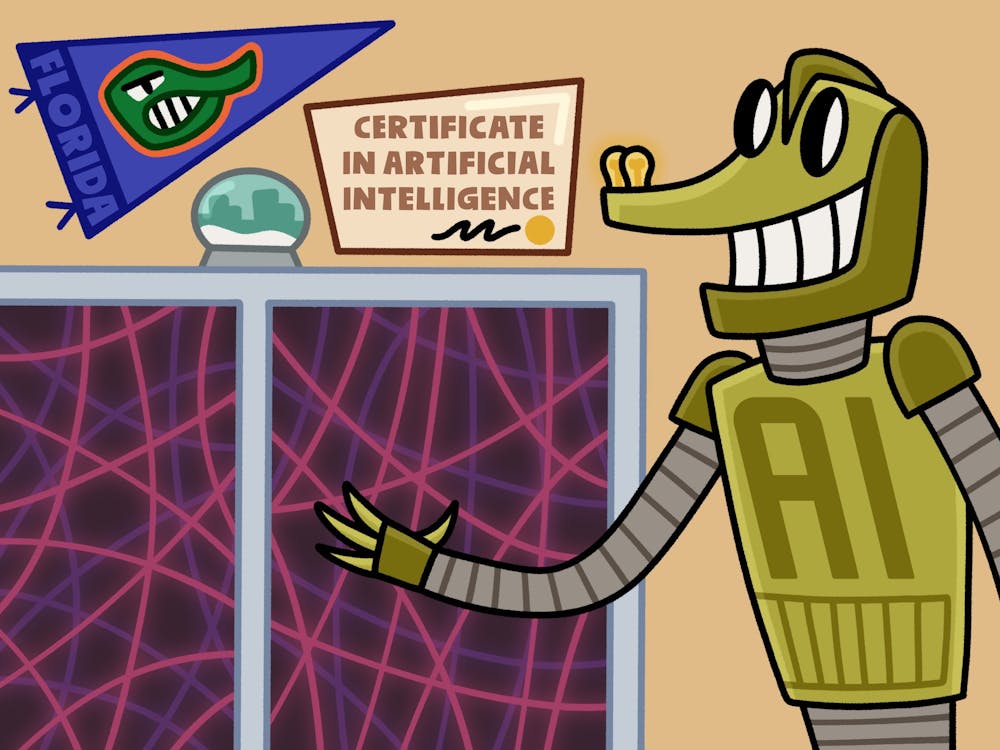When Joseph Glover came to UF in the 1980s, he witnessed empty desks transform. Personal computers began to dot their surfaces, forever changing the educational landscape.
Now, another transformation is happening with artificial intelligence, Glover, the interim provost for academic affairs, said.
“AI is the next revolution, and will be just as impactful, and maybe even more so than the introduction of the PC was,” he said.
Leading the AI revolution
In 2020, UF alumnus Chris Malachowsky donated $25 million to the university, and his technology company Nvidia matched the donation in services. The money led to supercomputer HiPerGator 3.0’s creation in January 2021.
In June 2024, HiPerGator was No. 62 on the TOP500 list, which ranks the world’s most powerful computer systems.
Glover announced modeling the AI Across the Curriculum initiative in 2023, which makes AI education available to UF students at any level — undergraduate, graduate or professional — through courses and degrees tailored to their disciplines. Each of UF’s 16 colleges offers three AI and data science courses, which amounts to 230 courses.
In 2022, the university established the AI Academic Initiative Center (AI 2) and an AI-focused task force to its Quality Enhancement Plan.
The QEP, which is a part of the university’s accreditation process, has a task force of 35 to 40 members to integrate AI into curricula and measure its impact on students' career prospects. Glover said he plans to form another AI-focused QEP task force in the next month to expand AI education for students over the next five years.
“The challenge is to anticipate and prepare for the AI environment, and I believe this task force will help define our future direction,” Glover said.
Glover is considering the ethical implications of AI as he arranges the QEP, he said. He’s aware of hallucinating, which is when AI provides incorrect information in an authoritative tone.
UF has faculty across various disciplines — philosophy, law, engineering, liberal arts and medicine — researching AI ethics, Glover added.
“Understanding AI ethics, biases, responsible use and privacy concerns is crucial,” he said, “because AI will have a significant impact on society and has the potential for both good and harm.”
AI expansion on campus
Matheus Maldaner, a 22-year-old UF data science senior minoring in computer science, is the president of Data Science and Informatics, UF’s first undergraduate data science organization. It is a partner of the Informatics Institute.
He also holds a leadership position on the AI Student Advisory Council, which empowers students to pursue opportunities related to AI. Maldaner has used HiPerGator for over a year since he took Fundamentals of Machine Learning.
Using the supercomputer, he investigated the “black box” problem in machine learning, which is when researchers cannot explain how an AI system came to a decision.
“The researchers that created a model really don't understand every single small bit of math that goes on inside,” Maldaner said. “They know that the model learned what you are supposed to, but it's just so complex.”
Maldaner said he believes every person should care about AI and be aware of its advancements. Instead of looking at AI as a competition, people should look at it as a tool, he added.
“There's many applications, but if you spend time just fighting it, not only are you not using its benefits, you're kind of losing to the person that is on top of their game and that is leveraging these resources,” he said.
The UF Information Technology department also launched the first comprehensive self-service AI platform in U.S. higher education, NaviGator AI, in July. Self service refers to the ability of users to interact with its database without human intervention or support, like Google Assistant or Amazon Alexa. HiPerGator powers the NaviGator platform, and as of Aug. 26, it has generated 3.4 million pages.
Education and ethics
UF computer science professor Amanpreet Kapoor incorporates Edugator, an AI platform where students can learn computing concepts that started in 2020, into his curriculum. Edugator was created by UF alumni Dustin Karp and Marc Diaz, as well as mathematics and computer science senior Prayuj Tuli.
It started as a small internal project, but because it was useful, Kapoor said he “invested a lot of time into developing it and scaling it up for other courses.”
There are about 3,000 students using the platform, but Kapoor plans to expand its reach to 100,000 students in the next few years.
Kapoor conducts research with AI to understand how to improve computer science education and student employability. His preliminary findings show students from low socioeconomic backgrounds are at a disadvantage in finding internships and jobs.
He recommends improving student employability through AI platforms like Skillbit, a cloud-based software application his students developed. It uses AI large language models to generate technical questions for mock interviews with recruiters, and it will start a limited beta phase this November for UF student organizations.
“If we do not prepare [students] on how to use these tools carefully and evaluate the information they produce, we're doing a disservice,” Kapoor said.
Kapoor said there also needs to be authority in vetting information from AI.
“Everything these models produce should be taken with a grain of salt,” he said.
UF engineering professor Laura Cruz Castro teaches data science and undergraduate programming classes. AI’s progression in institutions has led to added emphasis on protecting data, she said. UF has learning management systems and other platforms that it collaborates with to make sure data is not stored in third party servers, Castro said.
Castro is in favor of democratizing AI, but said there is a “very blurry line” about the ethics of using AI to generate ideas.
In her Python class, students are allowed to use Code Help and NaviGator to understand programming issues and examples, but they cannot use AI to solve entire problems.
“UF is a very innovative university, so a lot of ideas are actually valuable,” Castro said. “You don’t want those ideas to get out of here.”
Sophie Shah, a 20-year-old UF computer science junior, is pursuing an AI Fundamentals and Applications certificate, which UF began offering in 2020.
Shah learned about four different case studies of AI being used incorrectly or not working in the way it was intended in her Ethics, Data and Technology class. She said it's important for programmers to think of all the biases that may be present when feeding data into AI.
In one case, AI predicted biased recidivism rates and determined parole hearings. The case demonstrated the importance of getting multiple varying data sets to prevent those biases, Shah said.
“It was predicting Black inmates as being three times more likely to commit the same crimes as white people, even if that wasn’t actually true,” Shah said. “The biggest reason for that was because the data itself was biased that was being fed into the AI.”
Shah has used AI in her research for the Florida Institute of National Security. The program, which she joined this year, was offered to computer science students, and she said it is one of the UF’s best AI initiatives. FINS provides access to HiPerGator.
Originally, Shah wanted to be a software developer. But because of UF’s AI education, she is more interested in researching AI in the future.
“I think anyone who's interested in doing research in general, or in a kind of abstract route, and not going directly into industry would benefit a lot by kind of leaning into AI,” Shah said.
Contact Ella Dorfman at edorfman@alligator.org. Follow her on X @dorfman_ella.






